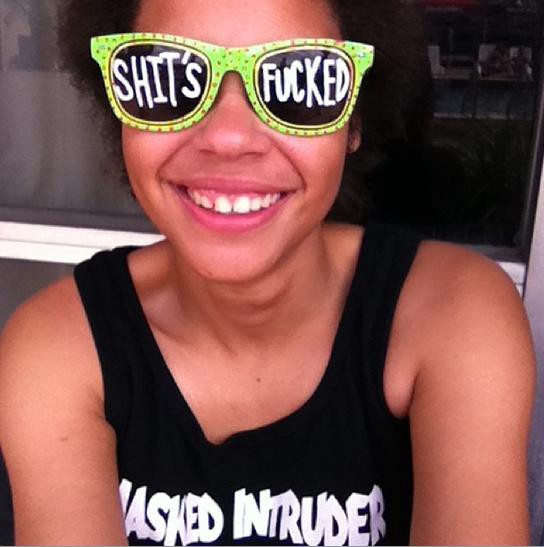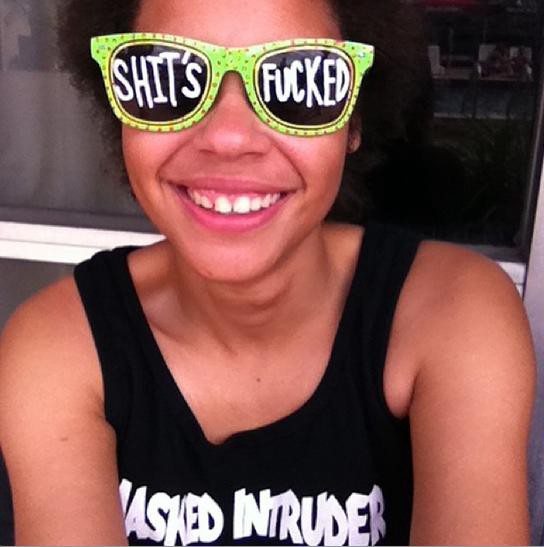A Place Like Home: On Being Black and Punk
by Pilot Viruet


The first year I went to Fest was on a whim, with a ticket bought while drunk. I drove down to the annual punk music festival in Gainesville, Florida, and crashed in a double hotel room with seven white dudes. Fest is a lost weekend of sloppy music and sloppier crowds, a beer-soaked vacation. I didn’t regret it.
On the second night — a particularly long one in which I found myself falling asleep in a dive bar as a loud band played — I wandered to the back bathroom to splash water on my face and wake up. Someone walked in while I was at the sink and suddenly a girl wrapped me up in a drunk, sloppy hug. When we were untangled from each other, she exclaimed, “I’m sorry, I’m just so happy to see another brown person at Fest!”
I had, as always, been aware of the sea of whiteness in the crowds and on the stage, but I hadn’t thought about it much until that moment when I realized that I was so goddamn happy to see her, too.

I’m not entirely sure of who I am. I simplistically identify as half-black (my mother, who was born in the Bronx) and half-Panamanian (my father immigrated to the US in his twenties). I am Native American and Trinidadian. My last name is French. My first name is a profession. I don’t fit in anywhere. Because I’m light-skinned, I’ve been told that I can “pass” by well-meaning but ultimately idiotic friends. Once, after more than five years, a friend was surprised to learn I was black. “But,” I sputtered incredulously, “haven’t you seen my hair?!” I’ve repeatedly been told that I am “not black enough,” though enough for what exactly, I’m not sure. I don’t look at all like my father or his family, and my accent is so atrocious that my high school Spanish teacher didn’t believe I was half-Panamanian until she met my father (even then, I suspect she assumed my mom fucked a white milk man). I stuck out in junior high in New Rochelle, high school in the Bronx, and sometimes college on Long Island. I stuck out when I visited Panama, a lanky stick with humidified hair sweating profusely in band t-shirts and tiny shorts. I have stuck out in every punk or indie show I’ve ever attended.
I stuck out on the cheerleading squad, too. My natural hair was too short for the necessary ponytail. The white girls who taught me about boy bands on z100 curiously stroked the weave I was required to get for the competition as they introduced me to *N Sync and TRL. My love for boy bands was mostly because of my love for boys, any boys who were cute and musically inclined. In high school, this led to super poppy “punk” bands — Good Charlotte, New Found Glory, The Ataris — and catchy “emo” — Brand New, Jimmy Eat World, and Taking Back Sunday. I loved that Good Charlotte, much like the rappers I grew up listening to, talked about how shitty it is to be poor. I loved that these bands had devastating crushes on people who would never love them back. I loved that they were angry because I was also angry, though I didn’t yet know what the hell I was angry about. I loved that these bands understood how awful and lonely it felt to be an outcast even if they were largely the reason that I was treated like an outcast.
It was a weird Catch-22: the more I felt alienated from my classmates, the more I listened to punk. But the more I listened to punk, and the more open I was about it and dressed the part, the more I was alienated by my classmates. To my white classmates, it was because I’m black, or Spanish, or whatever the hell. To my black classmates, it was because I “acted white,” and was nerdy, and I listened to dumb punk rock. I was a poser to every race in my school, so I flitted around aimlessly, finding comfort (and new bands) in music-oriented LiveJournal communities and message boards and liner notes. My brother relentlessly teased me for not being black and shopping at Hot Topic. My mother made her own share of “my daughter is so white” comments. It was hard to unpack that, as a black woman, I found solace in the words of white men. I felt guilty about it (and I sometimes still do) but the music, as the clichéd saying goes, made it OK. I’d leave class to hang out in the nurse’s office, citing a headache or sore throat or — as high school continued and it became clear something else was up — just general depression and lay on an uncomfortable cot listening to my Discman. I ran for my punk CDs after having my first anxiety attack in a math class, and after a classmate in home room glanced at my hair and told me I was dirty. I had my headphones on the afternoon I was sucker punched on the walk to the bus. I went home and talked about this only on the Internet, eventually finding people who got it.
Feeling welcome and at home while listening to Lifetime or The Lawrence Arms through my headphones does not necessarily translate to feeling welcome and at home during any given punk show where the audience (and, predictably, the bands) are always overwhelmingly white. I don’t know how many shows I’ve been to where I didn’t see another single woman of color, but I can tell you it’s disturbingly close to the total number of shows I’ve attended.
For the most part, I’ve had good experiences (at least in the context of being black; being a woman is an entirely different story) but I’ve always been aware. I’ve noticed questioning glances and obnoxious whispers. While bands that I respect will talk about the importance of racial equality on stage, people in the crowd’s gazes will almost unconsciously drift toward me, glancing in my direction as if for approval. When you are the other, you are always aware of being so, and are always seeking out the familiar; there is always an unspoken exchange between myself and any other black attendee in a white crowd. I used to toy with the idea of dying my hair, or straightening it, or even getting tattoos just to better fit in, to prove that I’m here because I fucking love this music, not because I’m tagging along with a white friend or boyfriend. “How can I find you at the Against Me! show?” a Twitter stranger to whom I’m selling a ticket to will ask. “Well, I will probably be the only black girl there,” I’ll joke, though there isn’t much to laugh about.
A few years ago, at a show headlined by The Queers (necessary disclosure: I was there for the opener, Masked Intruder, not The Queers or Teenage Bottlerocket), I was hanging by the bar when an asshole with laughable liberty spikes started repeatedly shouting the word “nigger” with the sort of emphasis on the -er that comes from years of hatred. He believed that he belonged there and I did not. It didn’t help that one of the bands had a Confederate decoration on one of their instruments.
There weren’t many options: I could attempt to respond to a man taller and much heavier than me, who was clearly intoxicated and itching for a fight; I could leave the venue (I didn’t want to stay anyway) but my friends were still there enjoying the show; I could simply leave the area but then he’d know that I heard him and that I was admitting defeat, admitting I didn’t belong; I could find one of the (white) men who came with me but I didn’t want to encourage what would inevitably be violence. So I stood there. I checked my phone. I pretended to enjoy the set. I felt sick and angry and cowardly and worthless. Like the one place that has felt like home — a sweaty punk show with likeminded people — 1had been yanked away from me, leaving me homeless once again.
I got over it, as I got over all racist incidents that happen to me, because there is no other way to keep moving forward. I keep it in the back of my mind, as I keep all racist incidents that happen to me, because there is no way to ever forget that feeling.

Now, once a year, at the end of October, my friends and I drive more than twenty hours for our beer-soaked vacation in Florida. Pints of PBR are no more than $3, so people have no qualms with tossing their near-empty cans in the air or toward the stage, raining down alcohol on everyone. It is a place that feels like home, but one where I never resemble any of my family.
Pilot Viruet is Flavorwire’s TV Editor, an AV Club contributor, and forever a punk teenager.